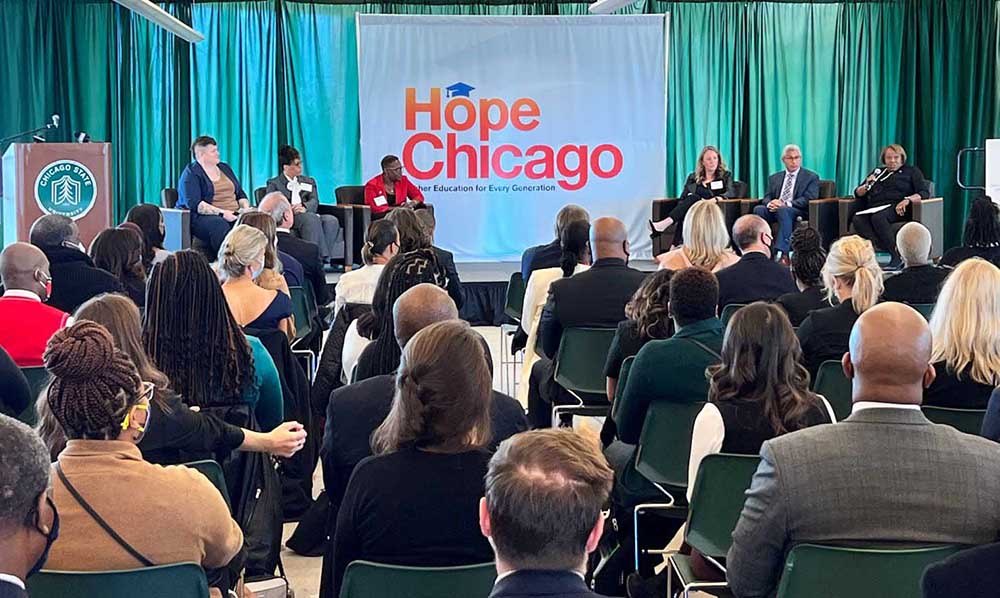New College Scholarship Program Led by Former CPS CEO Will Offer Students and Their Parents Full Tuition, Housing and Food Assistance
By Tatyana Turner
 A new scholarship program aims to send Chicago Public Schools graduates and their
parents to college.
A new scholarship program aims to send Chicago Public Schools graduates and their
parents to college.
Hope Chicago, led by former Chicago Public Schools CEO Janice Jackson, plans to raise $1 billion for students and their families to increase college completion rates and create educational equity.
“Hope Chicago is not like any other scholarship program,” Jackson said. “We are keenly focused on supporting all students, but also inviting their parents or guardians to go back to school as well.”
The two-generation initiative is one of two in the country, according to the nonprofit seeking to close the social and economic inequity gap by offering post-secondary scholarships and financial support for housing, food, health care and emergencies.
According to a 2019 study by the University of Chicago, about 82% of CPS students graduated from high school. Forty-two percent of CPS students enrolled in a four-year college or university, and 63% enrolled in a two-year institution. However, just 50% of those enrolled in a four-year college earned a degree, and 23% of students who immediately enrolled in a two-year program earned an associate’s degree or certificate.
Hope Chicago identified some of the hurdles students and their parents face in completing their post-graduate studies as finances, psychological stress and loneliness. Therefore, over the next 10 years, the scholarship program will be working to reach its $1 billion goal to create pathways for academic and economic success for Chicago families.
“Where we need to close the gap is really around scholarships,” Jackson said. “Many of our kids are getting to and through college, but they’re coming out with a lot of debt.”
Pete Kadens and Ted Koenig, Hope Chicago’s co-founders and co-chairmen, said the full-tuition scholarships are open to any CPS students or students from contracted Chicago public schools and their parents who can get into a post-secondary program, including two-year programs and trade schools.
“It doesn’t matter about your criminal history or your family’s criminal history, it doesn’t matter what ZIP code you live in, it doesn’t even matter what your GPA is,” Kadens said. “Students and families have had to face a share of barriers over the course of their lives; we’re not about to put more barriers in front of them.”
Jackson said the nonprofit wanted to get things started immediately. As part of its pilot program, 14 students received full scholarships for the 2021-2022 academic year. “They are going to Chicago State University and Chicago City Colleges,” Koenig said. “They will get laptop computers, college books, tuition money and spending money.”
The nonprofit plans to expand in 2022, with hopes to give 24,000 students and 6,000 parents/guardians scholarships over the next 10 years.
“I know this first-hand, the impact of Hope Chicago will change the city for the better, especially for Black and brown families who are often left behind in the education system,” Mayor Lori Lightfoot said in a statement.
To help get to its billion-dollar goal, Hope Chicago plans to forge partnerships with similar organizations and outreach programs. It also hopes to help 71,000 more high school graduates with support services such as counseling, mentoring and career guidance.
“(HOPE Chicago) and CSU are both aligned around the basic principles of equity,” said Zaldwaynaka Scott, president of Chicago State, a partner school. She said the institution is constantly working to improve opportunities for incoming college students, particularly students of color, including introducing dual enrollment to high school students, providing intensive advising, increasing internship opportunities and teaching financial literacy.
“We know there is a critical need for something disruptive, innovative ... and I see Hope Chicago as a program to do that,” Scott said.
Operational and administrative costs for Hope Chicago have been fully funded for the next three years, according to its press release. Therefore, every dollar raised will go directly toward students and their guardians if they choose to also pursue a post-secondary education program.
“It gives me motivation because I’m the first grandchild in my family to ever go to college, and with the help of Hope Chicago, I’m going to finish,” said Christopher Brakenridge, one of the first students to receive a Hope Chicago scholarship. He is a freshman at Chicago State studying communications, media art and theater, with a minor in early childhood education.
The rollout to get to each CPS high school will take time, but the process has already begun. With the first $100 million, the focus will be to identify priority schools and communities in need. By the end of the year, Hope Chicago plans to announce the initial CPS high schools it will be partnering with.
The first cohort of Hope Chicago scholars will be selected in late spring of 2022 and begin studies that fall.
“This is about a solution for a problem that exists and creating hope for everyone,” Koenig said. “Everyone has a seat at the table at this dinner, and we’re going to make sure that everybody eats.”

 All Rights Reserved
All Rights Reserved